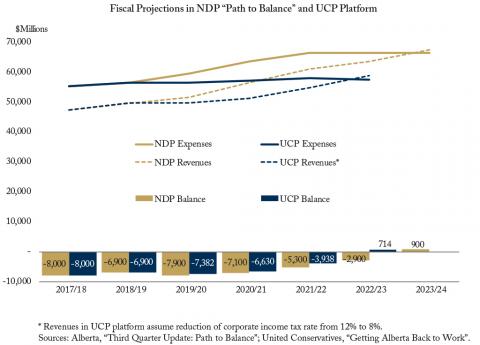From: Grant Bishop and Alex McBrien
To: Citizens of Alberta
Date: April 17, 2019
Re: Alberta’s Economic Road Forward
The United Conservative Party (UCP) will form Alberta’s next government. The election juxtaposed different visions for the return to fiscal balance. However, neither the NDP or UCP confronted the unsustainability of long-term public finances – in particular, revenue instability from over-reliance on resource royalties.
To spur investment-led growth, the UCP intends to cut the corporate income tax rate from the current 12 percent to 8 percent – well below that of other provinces. This would be a strong lure for new investment and help diversify Alberta’s economy without picking winners. It will attract new enterprise by being a low-tax place to do business.
The UCP also pledged to freeze program spending for the next four years. On a per capita basis, Alberta’s provincial government expenditures are well above the national average – and more than any other province. The UCP’s planned restraint would gradually bring Alberta’s per capita spending in line with the rest of the country. The province must begin the hard exercise of rationalizing expenditures: analysis by University of Calgary’s Trevor Tombe has underscored Alberta’s long-term structural challenges. However, hitting the brakes in the next budget will be a daunting task.
Unfortunately, successive governments have failed to save resource royalties in accordance with Peter Lougheed’s vision of a multi-generational Heritage Fund, nor heed well-accepted economic prescriptions (e.g., the famous “Hartwick rule” named after the eponymous Queen’s University professor). Over-reliance on oil and gas royalties has also veiled Alberta’s burgeoning outlay on public services. Alberta has been paying the credit card bill with the bricks of its house. The UCP platform did not address this structural problem.
Alberta’s political third rail remains a consumption tax. Economists – including Ergete Ferede and Bev Dalhby, Philip Bazel and Jack Mintz of the University of Calgary, along with our colleagues at the C.D. Howe Institute – have argued for shifting from less efficient income taxes by adopting a consumption tax, harmonized with the GST. Since this is a value-added tax on final consumption, it would not distort decisions to earn or invest. It rewards frugality and lets consumers choose when to pay. A provincial HST still brings jeers but, for long-term fiscal sustainability, Alberta needs political leadership that does not pander to the provincial sales tax allergy.
The new government should also take careful stock of the previous government’s policies and resist any reflex to toss the baby out with the bathwater.
While constitutional questions remain, courts will shortly provide clarity about the federal jurisdiction to regulate greenhouse gases. Outright nixing Alberta’s Climate Change Leadership Plan would likely surrender a made-in-Alberta approach for the imposition of a federal “backstop”. For example, as forthcoming C.D. Howe Institute research illustrates, the treatment of power generation in Alberta’s Carbon Competitiveness Incentive Regulation for large emitters is more economically efficient than the proposed regulations for Ottawa’s output-based pricing system.
As well, although the NDP did not publish key details of its arrangements for boosting crude-by-rail capacity, the UCP pledge to cancel these contracts may have been premature. The new government should carefully review the arrangements and potentially reconsider. While any government crude-by-rail must be on an equal playing field with prior private-sector investments, there is an economic case for a “market failure” to invest in rail given uncertainties on the timelines for pipeline completion and curtailment ramp-down. Indeed, a recent Intelligence Memo considers the economic rationale for subsidizing crude-by-rail.
While major flashpoints on the hustings also included non-fiscal issues, this election was about Alberta’s economy. That candid conversation must continue as this government plots its course – and should focus on solutions for Alberta’s long-term structural challenges. After a divisive campaign, Albertans must find common ground to confront our economic future together.
Grant Bishop is an Associate Director of Research, and Alex McBrien is Manager of Communications and Public Affairs, at the C.D. Howe Institute.
To send a comment or leave feedback, email us at blog@cdhowe.org.
The views expressed here are those of the authors. The C.D. Howe Institute does not take corporate positions on policy matters.






